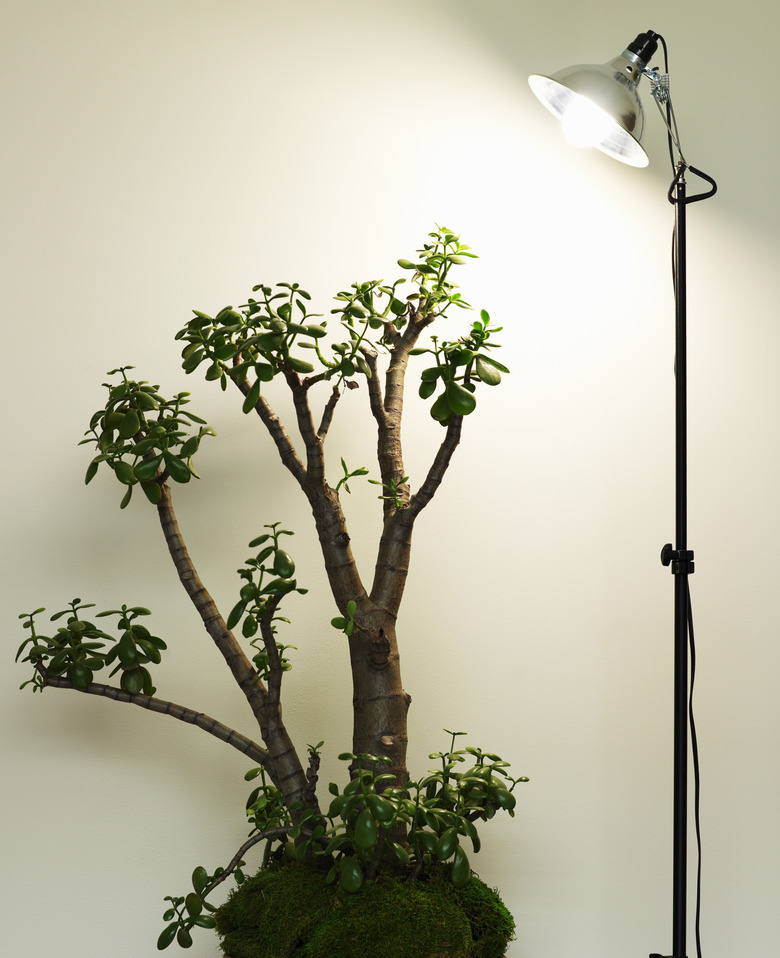Jade Plants & Cats
Jade plants (Crassula argentea) are fleshy-leaved succulents grow as houseplants and outdoor shrubs in U.S. Department of Agriculture plant hardiness zones 10 through 12. While these plants have decorative leaves and flowers, they aren't such a smart idea if you have cats. Jade plants are toxic to cats if eaten and can cause dermatitis if touched.
Jade Plants
Step 1
The jade plant, also called dollar plant or dwarf rubber plant, is native to South Africa. Grown as a houseplant, it has the appearance of a miniature tree or bonsai, reaching up to 30 inches tall, while those grown outdoors can reach up to 6 feet tall. Jade plants grow best in well-draining soil that is allowed to dry between each watering and in full sun or partial shade. The plants produce small white or pink clusters of showy flowers that complement the shiny, round green leaves in spring when grown outdoors — indoor plants usually don't produce flowers.
- Jade plants (Crassula argentea) are fleshy-leaved succulents grow as houseplants and outdoor shrubs in U.S. Department of Agriculture plant hardiness zones 10 through 12.
- Jade plants grow best in well-draining soil that is allowed to dry between each watering and in full sun or partial shade.
Toxicity
Step 1
The jade plant is toxic to cats if eaten due to an unknown toxin, notes American Society for the Prevention of Cruelty to Animals. After eating the plant, your cat may vomit or show depressed behavior, including lethargy and possibly a lack of appetite. Your cat may also become uncoordinated and the feline's heart rate may even become slowed, although this is a relatively rare side effect, notes the Vetstreet website. The sap of the jade plant can cause dermatitis for both people and animals if it comes into contact with the skin, warns University of California Agriculture and Natural Resources. All parts of the plant are considered mildly toxic to cats.
Treatment
Step 1
If you suspect your cat has eaten any part of your jade plant, get the kitty to the vet right away for treatment. While poisoning symptoms are generally mild, your vet may administer intravenous fluids to prevent dehydration from vomiting. The vet may also induce vomiting to get the plant matter out of the cat's system. For dermatitis caused by the jade plant, wash the area thoroughly with a mild dish soap to remove it from your cat's skin before bringing the kitty to the vet for care, recommends petMD. Washing the area stops the sap from further irritating the skin and also prevents your cat from licking and ingesting the toxic sap.
- The jade plant is toxic to cats if eaten due to an unknown toxin, notes American Society for the Prevention of Cruelty to Animals.
- For dermatitis caused by the jade plant, wash the area thoroughly with a mild dish soap to remove it from your cat's skin before bringing the kitty to the vet for care, recommends petMD.
Prevention
Step 1
Keep your jade plants away from your cats, putting them in a room the cat can't enter or in an area outdoors that your cat doesn't have access to. While the California Poison Control System lists jade plants as nontoxic to people, the plant may still cause mild stomach upset or dermatitis if eaten or touched. For this reason, keep the jade plants away from both curious children and pets to prevent potential problems. Pick up all clippings of your plants to discourage your cat from eating them or playing with them, coming into contact with the sap inside.
References
- American Society for the Prevention of Cruelty to Animals: Jade Plant
- Clemson Cooperative Extension: Jade Plant
- Vetstreet: Ten Household Plants That Are Dangerous/Toxic to Dogs and Cats
- University of California Agriculture and Natural Resources: Safe and Poisonous Garden Plants
- PetPlace.com: 20 Common House Plants: Are They Dangerous to Your Cat?
- Missouri Botanical Garden: Crassula Ovata
- Cal's Plant of the Week: Crassula Argentea — Jade Plant
- petMD: Poisonous Plants for Cats
